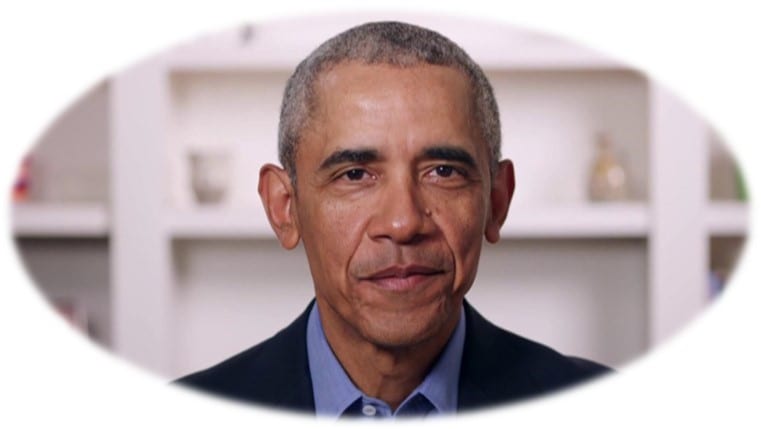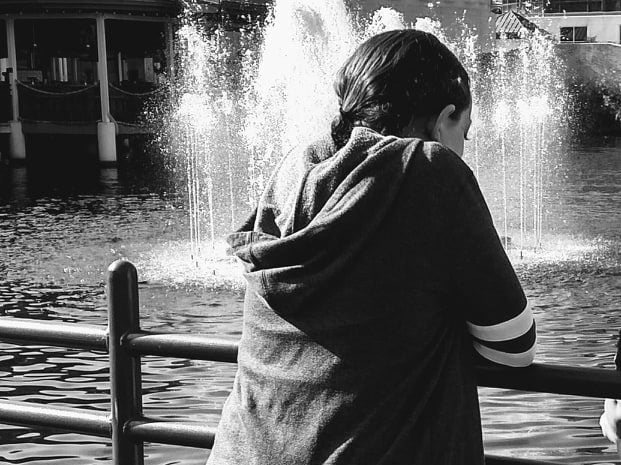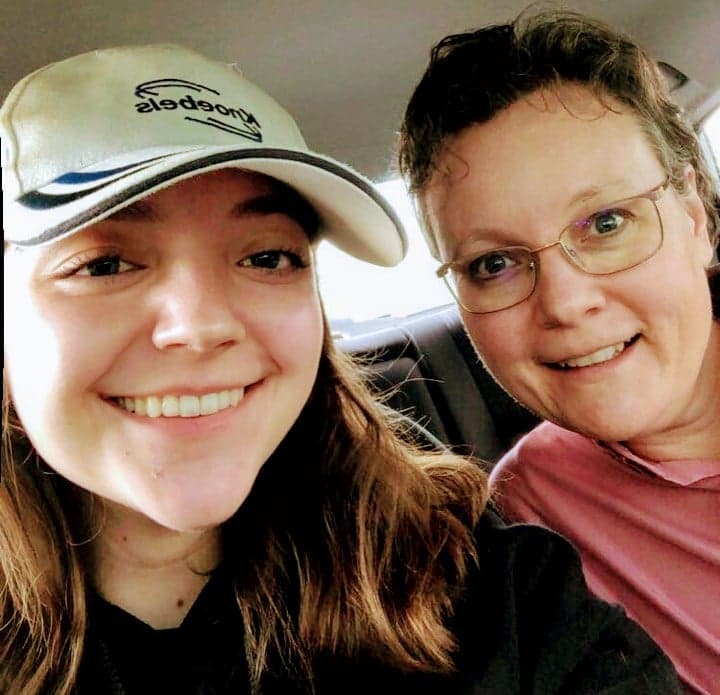I watched Obama’s commencement speech with my teen-aged daughter. Here’s what she and I heard, what we felt, and what lessons we took with us.

I watched Obama’s commencement speech for Graduate Together 2020 together with my husband and my daughter, Rachel, who is finishing her junior year in high school. [You can read the full transcript here.] As a professor who teaches preaching at a seminary, I was intending to listen through a lens of analysis. I wanted to discern his rhetorical process and find out what made the speech tick.
But as I listened, I found myself putting away the analytical lens at first and just being present to the moment. Just after his first three sentences, I felt myself relax. There would be no inflammatory word-bombs. No gaslighting. No attacks on vulnerable people. Just the opposite. Here is a president who knows how to put cohesive sentences together and deliver a speech with authenticity, candor, wit, and inspiration.
Frankly, I was riveted.
Across the country, millions of viewers were united in supporting the more than 3 million students graduating without proper ceremonies in the midst of COVID-19. And we heard a commencement speech worthy of both the gravity and joy of the moment. After more than three years, I had almost forgotten what an effective presidential speech could – and should – sound like. I realized that what we were experiencing was a rhetorical antidote to the hate-speech we’ve been subjected to under the Trump regime.
Obama’s commencement speech may have been addressed to the graduates, but it was meant for all of us.
He began with simply stating how proud he is of the students, as well as their teachers, coaches, and parents. And he pointed out the extraordinary challenges that many of them have faced even without the pandemic. He named illness, social media, school shootings, climate change, and for some, “living in a neighborhood where people too often count you out.”
When was the last time we heard that kind of compassion from our current president? Never, of course. Recognizing the struggles that teenagers are dealing with is so important. Simply naming their pain is an act of validation.
Obama is well-know for his “dad humor,” his wit that is both silly and charming.
There were moments of this kind of humor in his address. Admitting that sometimes his speeches go too long. Pointing out that he doesn’t look good in those graduation caps because of his “big ears.” This kind of self-deprecating humor is only possible when a speaker is both humble and confident. Their ego is in check, and they can laugh with us rather than get defensive. Again, this is a quality we have not seen in the White House for more than three years.
But what struck me is that this speech worked on two levels.
Obama’s commencement speech was addressing not only the graduates, but also a nation that needed to hear the hard truth, as well as the hope and promise for a better future that lies within and among us. For three years, we have been reduced to a juvenile Lord of the Flies nation led by an authoritarian man-child who thrives on rancor and divisiveness. But now it’s time to grow up again. It’s time to move on from this horrific chapter in our nation’s history. It’s time to recover from the political virus that has infected so many. We need to rebuild the ethical and moral foundations of our democracy.
So when Obama said, “What remains true is that your graduation marks your passage into adulthood,” I heard this said to a country that needs a graduation from Trumpism. It’s time for good and decent people to take charge of our own country and decide what is important to us, the values we want to live by.
Yet Obama acknowledged that this is also a scary time for these graduates (and thus for us all). The “deep-seated problems” that existed pre-COVID-19 are brought into sharp relief and exacerbated by this pandemic. Economic inequality, racial disparities, and lack of healthcare are just a few issues that Obama named. All of this and more can be overwhelming.
“All of which means that you’re going to have to grow up faster than some generations.”
I thought of my daughter when he said this. And I was strangely comforted. The graduating class and those coming right behind them are seeing the worst that this nation can throw at them. They know that many of those currently in power care nothing about protecting them from gun violence, or the climate crisis, or pollution, or the ravages of the coronavirus. And they are seeing that many of the grown-ups who are entrusted with figuring out how to solve these problems “aren’t even asking the right questions.”
But if this generation can embrace the values their teachers and coaches and clergy are instilling in them, if they can utilize the critical thinking skills being taught to them, then they can meet these challenges.

“This is your generation’s world to shape.”
I asked my soon-to-be-17-year-old daughter what she thought of Obama’s commencement speech.
“I appreciated when he acknowledged he’s one of the ‘old guys,’ so he’s not going to tell us what to do,” Rachel said. “He’s setting a good example for how we should be running things, but he’s telling us that this is our time. And he’s right, it is our time.”
And what did she think about the three pieces of advice he gave? Her response gave me several things to think about as I continue to guide her and the ministry students I teach.
1 – Don’t be afraid.
Obama insisted that America will rise from these tough times as it has in the past. “Usually because a new generation — young people like you — learn from past mistakes and figured out how to make things better.”
Does Rachel share his optimism? Yes.
“As soon as you accept that it’s too late, then it is too late,” she said. “If you believe that everything is over, then it is impossible to get up and do the work. Your mindset is already in the gutter. But if you believe things will get better, then you will work to make them better.”
This work is possible when people have a strong moral core and follow a clear ethical compass. Which leads to Obama’s second piece of advice.
2 – Do what you think is right.
Obama set a stark contrast between those who act like “little kids” by “doing what feels good, what’s convenient, what’s easy” and those who ground themselves in “values that last.” The values he named – honesty, hard work, responsibility, fairness, generosity, respect for others – are exactly what we have not seen demonstrated by the current president and his administration.
“This makes me feel like, if I don’t do it, who will?” my daughter said. “Everyone has to contribute somehow. Each of us has a personal responsibility to make things right.” And one way this happens is by following Obama’s third piece of advice.
3 – Build a community
Rachel saw this as the biggest challenge at the present time with the pandemic isolating so many folks. “I think that a lot of people are just focused on the wellbeing of themselves and their families right now. But the sooner we come to realize that it’s affecting everybody, the sooner we can address the problems Obama was talking about,” she said. “It’s going to become more important to help each other. You can’t get through it yourself.”
She’s already seeing examples of the kind of leadership Obama is calling for from her generation. We recalled the teenagers across the country who organized walk-outs after the Parkland School shooting in 2018 to protest gun violence in schools. She pointed to Greta Thunberg and the young people who are leading the way in addressing the climate crisis. And she noted that the entire Graduate Together program that evening highlighted the work this graduating class is doing to create a more just, equitable, creative, and restorative society.
“When I see all of this already happening, it helps me to have hope that things are going to get better,” my daughter said.
“What really struck me was when Obama talked about how we are the generation that is going to be the one to fix things. I felt a sense of pride that I was part of a generation that was speaking up and preparing to lead.”
Indeed, as Obama said, “You don’t need us to tell you what to do, because in so many ways, you’ve already started to lead.”
Yet, Obama’s commencement speech is a reminder to us “old guys and gals” that we, too, must turn away from the childish, selfish, divisive, and hateful ways that have been pushed upon us from the White House for the past three years. We owe it to the graduates and those coming after them to live up to the ideals we are asking them to embody.
Yes, the class of 2020 is making us proud. Let’s make them proud of us as well.
Read also:
10 Leadership Lessons from Kentucky Governor Andy Beshear
Governor Andy Beshear Takes Us to Church: 5 Lessons from COVID-19 Briefings

Leah D. Schade is the Assistant Professor of Preaching and Worship at Lexington Theological Seminary in Kentucky and ordained in the ELCA. Dr. Schade does not speak for LTS or the ELCA; her opinions are her own. She is the author of Preaching in the Purple Zone: Ministry in the Red-Blue Divide (Rowman & Littlefield, 2019) and Creation-Crisis Preaching: Ecology, Theology, and the Pulpit (Chalice Press, 2015). She is also the co-editor of Rooted and Rising: Voices of Courage in a Time of Climate Crisis (Rowman & Littlefield, 2019).
Twitter: @LeahSchade
Facebook: https://www.facebook.com/LeahDSchade/













